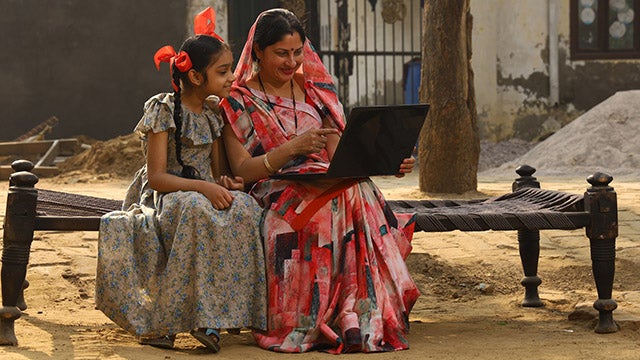“Poverty is a multidisciplinary issue. Most of what we do in this space is about who we are… we must honor who we are when trying to contribute to efforts to alleviate poverty. So, do what you do best to help, and bring your A game.” Jonathan C. Lewis, founder of Microcredit Enterprises, Opportunity Collaboration, and iOnPoverty, had this advice to share with the audience at the Institute’s Breakthrough Strategies for the Bottom Billion Society of Fellows Luncheon on July 13th in Aspen.
 At the luncheon, Institute Vice President of Policy Programs and Executive Director of Aspen Institute Global Health and Development Peggy Clark and Lewis engaged in a discussion on poverty, and where they have seen innovations that have been successful in lifting people out of poverty.
At the luncheon, Institute Vice President of Policy Programs and Executive Director of Aspen Institute Global Health and Development Peggy Clark and Lewis engaged in a discussion on poverty, and where they have seen innovations that have been successful in lifting people out of poverty.
The first half of the discussion focused on the role of microfinance as a tool of economic and personal empowerment for the four billion people in the world living on less than a dollar a day. Clark, who was a pioneer in the microfinance movement, described it as a “breakthrough innovation that continues to reach millions of people, especially woman, by leveraging their social capital and giving them access to credit as one vehicle for moving out of poverty.”
But microfinance is one strategy among many, Clark and Lewis reminded the audience. During the remainder of the luncheon, they explained that in order for each of us to help alleviate poverty, we must honor who we are and do what we do best.
When Lewis was asked what can make the biggest impact on impoverished communities today, some were surprised to hear his reply. “Water,” he said. “I think providing clean water can truly make the biggest impact. I just don’t know how to do water. I’m not a trained engineer.” Lewis continued explaining how microfinance is what he’s passionate about and where he feels he can contribute most, encouraging others to harness their unique talents to help. “If you want to make a true difference, you must do what you do best, whether that’s finance, medicine, architecture, engineering, or the arts.”
When asked if he really thought that everyone using their own talents would be enough to raise people out of poverty, Lewis acknowledged that “anything we do will be insufficient, but that’s not an excuse for not acting. Poverty is urgent and we must act now.”
Click here to learn more about Peggy Clark’s work with Aspen Global Health and Development, and here to learn more about Jonathan Lewis’ current ventures.

